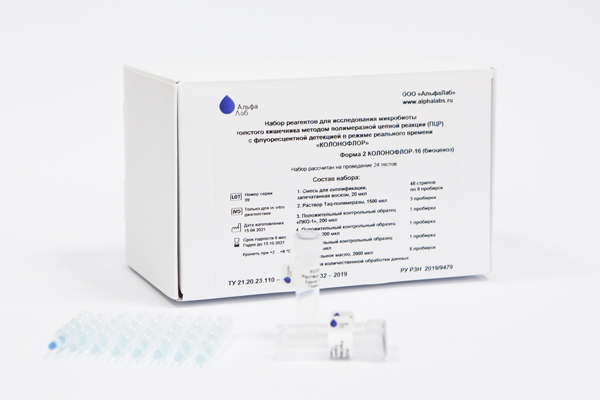Catalog
Colonoflor 16
Recent studies have convincingly demonstrated the important role of intestinal microbiocenosis disorders in the pathogenetic mechanisms of various diseases of the gastrointestinal tract.
Intestinal normal flora is a qualitative and quantitative ratio of diverse populations of microbes that maintain the biochemical, metabolic and immune balance necessary to maintain health. Under intestinal dysbiosis understand the change in the qualitative and / or quantitative composition of the intestinal microflora with the subsequent development of metabolic and immunological disorders with the possible development of gastrointestinal disorders. In dysbacteriosis, an obligate intestinal microflora deficit is accompanied by an increase in conditionally pathogenic microflora and an increase in its share in the microbiocenosis.
The “COLONOFLOR” reagent kit is intended for the quantitative assessment of the microbiocenosis state of the large intestine in children and adults by the method of polymerase chain reaction (PCR) with fluorescent detection of amplification results in real time. The “COLONOFLOR” reagent kit is designed to detect the DNA of obligate representatives of the large intestinal microflora (bifidobacteria, lactobacilli, Escherichia coli), as well as opportunistic microorganisms.
The list of identified indicators:
- Total bacterial mass
- Lactobacillus spp.
- Bifidobacterium spp.
- Escherichia coli
- Bacteroides fragilis group
- Bacteroides thetaiotaomicron
- Faecalibacterium prausnitzii
- Clostridium difficile
- Clostridium perfringens
- Klebsiella pneumonia
- Klebsiella oxytoca
- Escherichia coli enteropathogenic
- Enterococcus spp.
- Proteus spp.
- Enterobacter spp. /Citrobacter spp.
- Fusobacterium nucleatum
- Staphylococcus aureus
- Candida spp.
- Salmonella spp.
- Shigella spp.
